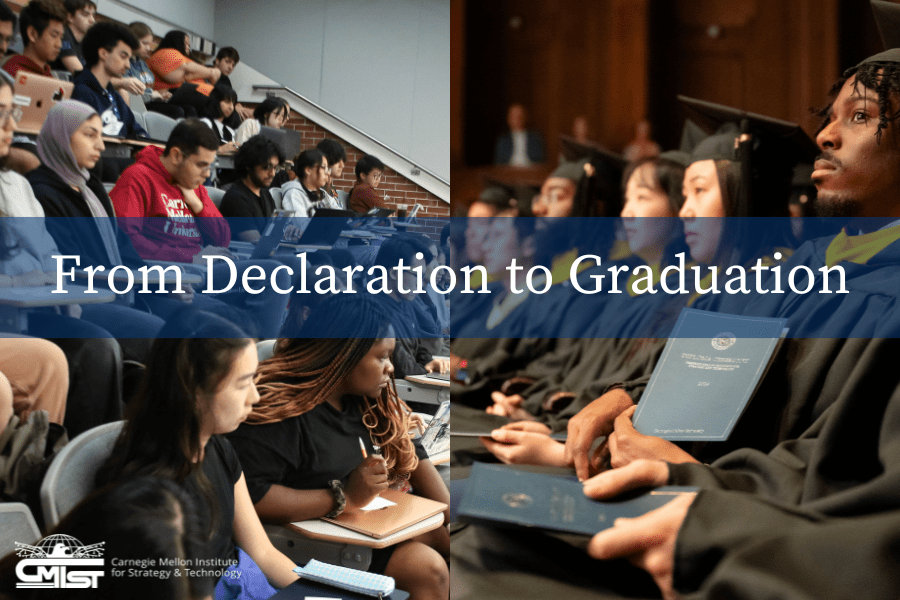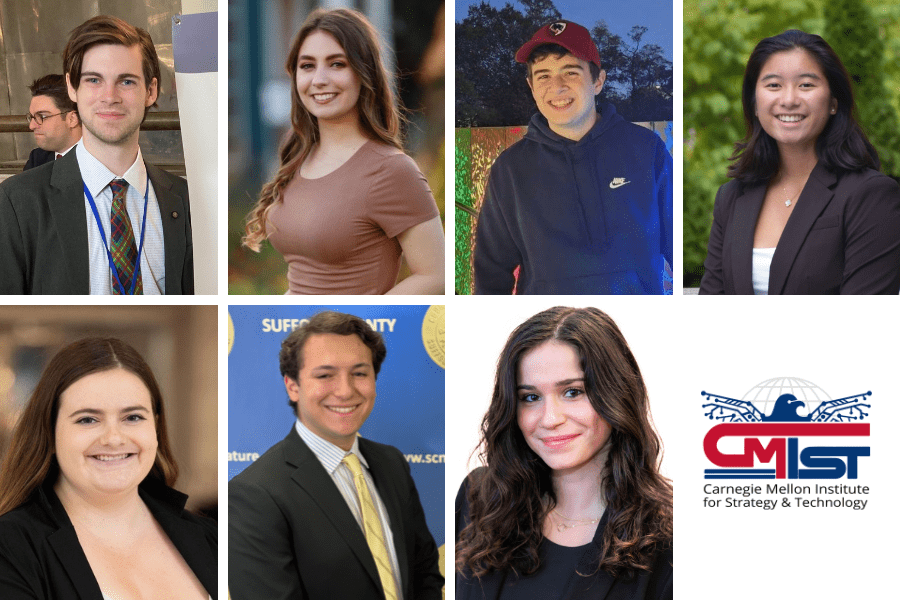
From Declaration to Graduation
And Everything In Between
By Lindsay Marcellus
The Carnegie Mellon Institute for Strategy and Technology (CMIST) attracts students eager to make the world a better place. Whether they plan to work at the intersection of national security and emerging technologies or to seek careers in foreign policy or law, CMIST students spend their time at Carnegie Mellon University (CMU) learning the skills needed to positively impact society. We asked undergraduate students to give us a glimpse into their planning over their four years at CMU, from what went into the decision to declare a major to how their coursework interacts with other opportunities at CMU to influence their career trajectory.
Some students know what major they want to declare when they enter CMU. For example, rising senior Creighton Arrington planned to major in international relations and political science before he even stepped foot onto campus. However, he credits his coursework at CMIST, especially classes on technology and war and civil-military relations, for not only teaching him key concepts in the fields of defense and international security, but also helping him identify specific career paths within his broader goals of analyzing foreign policy and international relations.
For Arrington, the opportunities for interdisciplinary work have been a highlight of the program. He added minors in military strategy and international relations and Chinese studies, found opportunities to integrate his varied interests and backgrounds through classes like “Asian Strategies,” and attended the 63rd Naval Academy Foreign Affairs Conference in April 2023 as a CMU delegate. “I think the interdisciplinary framework of the program allows students to pursue topics they are genuinely interested in and enables those students to become relative experts in the historical backgrounds and cultural workings of a given topic,” Arrington explains.
Not all students are set on what degree they want to pursue when entering CMU. When deciding on a major, students take several factors into consideration, including their interests and passions, career goals, assessment of the needs of society, access to mentorship and support, and life experiences.

For example, Isabel Leong is working towards a career in cyber security and national security, but is also concerned about protecting democracy. In a time characterized by swift and extensive changes in technology, Leong, a rising sophomore, wants to contribute to policies that prioritize people’s rights and well-being. “In a rapidly evolving world shaped by emerging technologies, it is crucial for decision makers to understand the national and global implications, as well as historical discussions, regarding these technologies and their impact on international relations,” she explains. Through the new major in political science, security, and technology, Leong found the way to integrate her passions for technology, policy, and diplomacy while pursuing an additional major in statistics and a minor in information privacy, security, and policy.
Other students are drawn to careers in law or American politics. Zachary Berger wants to work as a lawyer for the US government. Given his passion for politics and government, combining the international relations and political science major with the minor in American politics and law was a natural choice. Berger, a rising sophomore, is also pursuing an additional major in decision science. Beyond helping him prepare for law school, Berger was also drawn to the major because of the CMIST faculty. “I really felt like the faculty wanted to meet you and cared about your studies,” he shared.
Student interests are often influenced by their life experiences. Anthony Cacciato, the child of small business owners, has been keenly aware of the economic implications of politics from a young age. A rising junior who is majoring in economics and politics and minoring in both American politics and law and business administration, Cacciato hopes to utilize his skills and knowledge to be an effective public servant. “I believe it's critical that anyone who hopes to represent members of their community should not only be intimately aware of the issues facing their community, but be equipped with the knowhow and skills to properly address these concerns,” said Cacciato, who has gained a thorough understanding of the role that economic theory plays in policymaking through his course work.
In order to create connections between what they learn inside and outside the classroom, students frequently look for experiential learning opportunities during their years at CMU. Many students, including Leong, Berger, and Cacciato, plan to complement their academic learning with a semester living, studying, and interning in the nation’s capital through the Carnegie Mellon University Washington Semester Program (CMU/WSP), which is hosted by CMIST.
The semester in DC gives students who are interested in policy, law, government, business, and/or advocacy the chance to explore what kind of career they want to have in the future while learning valuable skills. Participants in the program have completed internships at the Executive Office of the President, the Supreme Court, the Environmental Protection Agency, and the American Bar Association, to name a few.
Students who already have a clear idea of the work they hope to do after graduation have the chance to synthesize their interests, apply their classroom learning, and gain relevant work experience. “I’ve been able to see many components work together and strategize about approaches to keeping Americans safe from drug abuse,” said Arika Manuel, who completed an internship at the White House Office of National Drug Control Policy through CMU/WSP this past spring.
A rising junior majoring in international relations and political science with an additional major in environmental and sustainability studies, Manuel’s coursework has helped broaden her understanding of both the geopolitical context of the issue as well as the potential to address the problem through policy. Her experience in DC helped her gain valuable experience that supports her plans to build a career focused on illicit drug policy and reducing drug overdose deaths.
Taken together, CMIST coursework and opportunities for interdisciplinary and experiential learning prepare students for their next steps after they complete their undergraduate education.
Vita Shats, who graduated from the Dietrich College of Humanities and Social Sciences this spring with a bachelor of science in international relations and political science, found that her CMIST coursework connected well with her experience in the CMU/WSP. “Classes such as Decision Processes in American Political Institutions (DPAPI), Representation and Voting Rights, and Writing for Political Science and Policy were crucial to my foundational learning of how the government works and bolstered my experience in CMU/WSP,” Shats explained. She is interning for Congressman Ruppersberger on The Hill this summer with ambitions to attend law school.
Rising senior Emma Rogers was drawn to the new major in political science, security, and technology the moment it was announced. While she started her journey at CMU as a computer science major, she was searching for opportunities to focus on the applications of technology in society and explore broader issues in technology adoption.
“Every new advancement doesn't exist in a box -- its utility is determined with how we react as a society and apply it,” said Rogers, who is preparing for a career tackling the challenges of technology regulation, adoption, and protection. With multiple opportunities to adapt course material to fit her area of policy expertise, Rogers, who also has a minor in information security, privacy, and policy, found that the major has prepared her well for her next step; this fall she begins the Accelerated Masters of Science in Information Security Policy and Management (MSISPM) offered by the Heinz College of Information Systems and Public Policy.
While no two journeys are exactly the same, over their time at CMU, students learn to leverage the skills and knowledge acquired through coursework and experiential learning to become empowered change-makers.
Students interested in discussing or declaring one of the majors or minors that CMIST offers should contact Emily Half, deputy director for academic affairs.
